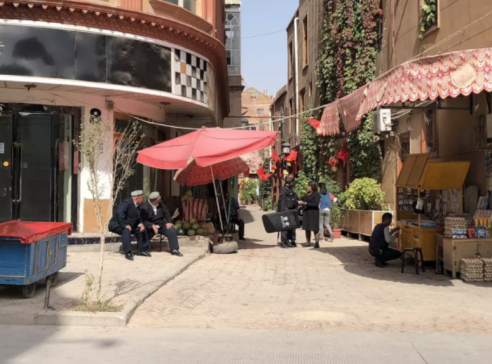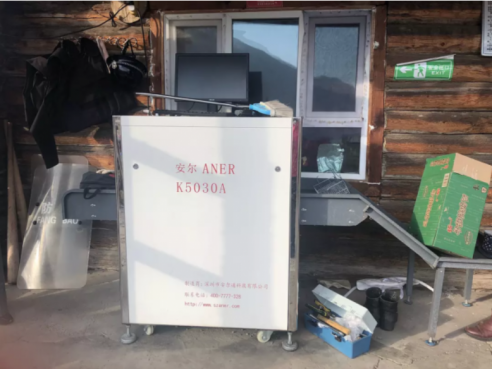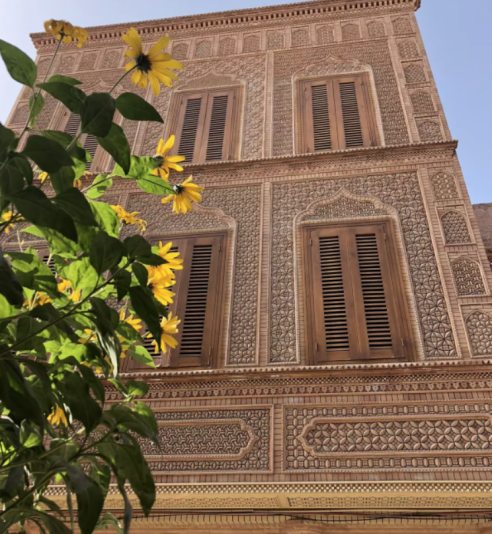Amid an ongoing security crackdown in Xinjiang that has included the controversial use of a network of “reeducation” camps holding over a million ethnic Uyghurs and other Turkic Muslims, an anonymous Han student posted her account of the intense “atmosphere of control” she witnessed while touring the region over the recent National Day holiday. The account, shared on Douban, has since been made private, but is archived in full at CDT Chinese. CDT has translated excerpts from the full post focusing on the tourist’s overall impressions of Kashgar, interactions with a Han police officer, and her experience talking with two young Uyghur civil servants tasked with “maintaining stability” in their home region:
[…] Security Check and Safety
The first time I witnessed safety measures was at a small hotel near Urumqi airport. There was a security gate at the entrance, with a set of anti-riot armor placed next to it. As you step through, you realize this is merely a formality, and that you’ll need to get used to many similar scenarios. At the hotel check in desk you’ll have your picture taken, which will be matched with your ID card. The friend who was checking in with me asked whether this violated our rights to our own photos. The man at the front desk said: don’t ask about photo rights, there aren’t even human rights. I was surprised and tried to ask more questions, but none of the staff seemed willing to engage with me. Instead, they continued to chat about topics like, “the community is paying too little overtime bonus.” I think they are referring to community-based security maintenance work. I wasn’t able to figure out their emotions [concerning these topics].
The first time I personally experienced a security check was at the International Grand Bazaar in Urumqi. There were two lines, one for tourists, the other one for people who need their IDs verified. I didn’t know the difference while lining up. I was getting ready to take out my ID until someone ushered me forward. Then I placed my backpack on the security machine (no need to go in details on this one). So, thanks to my Han face, I was able to start my trip as a typical, carefree tourist.
Compared to the Grand Bazaar where locals frequently visit, bag checks are almost nonexistent for tourists in the old town of Kashgar and the Hemu Village at Kanas Lake. I stayed for two nights in wood cabins in the rural areas of northern Xinjiang. Almost all cabins have a security machine and a set of anti-riot armor. The cabin owner told me that they spent 10,000 RMB to set up [or install] the machine. Now it takes up so much space and seems to have quickly become a shelf for miscellaneous junk.
More direct experience came in Kashgar, where I spent three nights at a hostel in the old town. We stayed in a less commercial, touristy area to the west of North Jiefang Road, near Id Kah Mosque. I say it’s less commercial because many of the buildings were obviously undergoing reconstruction and renovation. Across from the street was an elementary school, and around the corner is where locals live. We went during the National Day holiday, almost every family had put up a national flag. The five-starred red flags floating densely over the ethnic buildings, diluting the local flavor. Every time I raised my phone, I tried not to capture the flags.
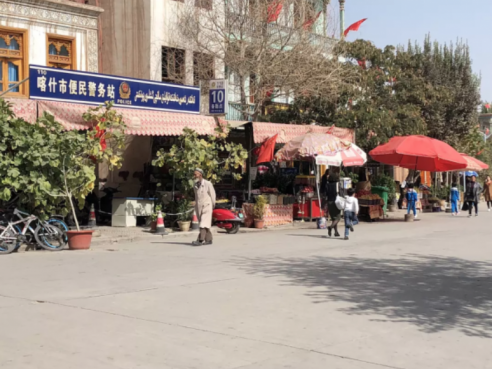
The entries and exits in the old town all had security equipment to check the IDs of ethnic minorities. There were restrictions as to when you may come and go. One night around 3am, we came back with some friends from the hostel, bringing noise to the sleeping street. Going through the entrance, some people said “good night” to the police on duty. I suddenly felt a bit sad. Another time, I saw a Uyghur boy wearing a hood quickly run through the tourist’s entrance, successfully avoiding the ID check.
The street in front of our hostel had a police officer standing in anti-riot armor every 10 meters or so. It is said that the densely positioned auxiliary police and the security forces in town are boosting up employment for many. Some time during the day, I saw a group of locals in orange jackets walking on the street with long bats. Some locals told me that they were business owners in the neighborhood. They formed a security team and patrolled every day.
These fixtures in old town Kashgar serve as disappointing oddities even for tourists. When trying to frame a picture, one had to cautiously avoid the people and things that “spoil the vibe” of the traditional architecture, although many of these “vibes” were man-made as well—for example, even the circuit boxes wore khaki-colored ornaments on them. But at this time [National Day holiday] the flags and the banners were unusually shiny. […]
And here’s my most shocking roadside conversation. I was sitting on a bench, tying my shoelaces. A Han police officer was sitting next to me. He struck up a conversation, asking me what I was here for. I said without thinking that I was here for tourism. Then the conversation took a surprising turn. He said, “I don’t understand how this is a good place for tourism. Don’t you know the situation here?” I explained by saying the architecture here has character. He said, “Do you really think the architecture is pretty? These are Uyghur-style buildings. We are against that.” Then he murmured an opinion fit to be censored. I wasn’t prepared for any of this. He spoke in a low voice, with a northerner’s accent. I didn’t get all of what he was saying. So I asked some questions.
To my surprise, this Han police officer suddenly started to question me. “You are not a spy, are you?” “Are you really a student?” I even had to show him my ID upon his request. He laughed and said: you were born in 1994 and still in school? I started to panic. That didn’t add up for sure. I brushed him off and walked away. After returning to my hostel, for an hour or two I was immersed in terror and guilt. That was my first day in Kashgar. All I could think about was leaving that place. “Do you really think the architecture is pretty?” Besides knowing that I did wrong, and that I found trouble for myself, this question from him lingered in my mind. It made me think about my intention. The atmosphere of control here is crystal clear. Although I didn’t know what impact it had on the locals, I could have imagined what it must feel like to have your ID checked every time when you try to enter or leave some place. What was more difficult to accept is using this method as protection for tourists, so that the Han tourists could freely enjoy the carefully renovated ethnic characteristics. I feel bad when I think about how I had fun taking pictures of the alleyways during the day. […]
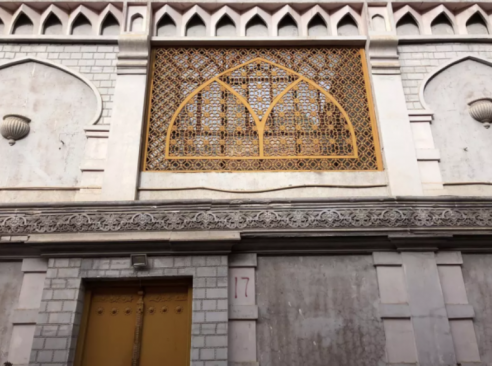
Young Civil Servants
Lastly, I want to write about the people. The stories above all derived from what I saw and thought. I must admit that sometimes I indulge in my own sensitive emotions. So I will try my best to write about these two Uyghur friends I met.
A is the young woman who showed us around Kashgar. She became a civil servant in the managerial economics sector in a township under Kashgar’s jurisdiction. To welcome her friends from college, she used her vacation days to drive us around. B is the Uyghur young man we had dinner with before leaving. He works as a civil servant in a village here. He heard we were coming at the last minute and couldn’t take time off, but he spent an afternoon catching up with two people from Shanghai. A and B were [our mutual friend] Mu’s college classmates. They graduated last year with a major in engineering from a university in Yangpu District, Shanghai.
Against all odds, the first time I met a civil servant my own age was actually in Xinjiang. It felt quite weird to hear them lay out the official narrative in their slightly accented Mandarin.
Their jobs are very demanding. They seldom have holidays. A told me that she is the only ethnic minority in her work unit. Her supervisor thought highly of her and often sent her to go to conferences and do presentations in Kashgar. We asked whether she used the Uyghur language in those meetings. She said, of course we used Mandarin. This young Uyghur woman who spent four years in China’s interior speaks very good Mandarin. Despite her accent, she’s quite skilled in all kinds of idioms. Sometime I think her speaking is actually more effective and accurate than my own. She’s equally gifted in her political ability. Every Monday morning, she hosts the flag raising ceremony at her work place, and does a presentation in Uyghur and Mandarin. She shows me in a vivid way how she handles disobedience. I think I’ve seen similar methods from my elementary school and middle school teachers: “Hey, if you like to talk so much, how about you come up here to do the talking?”
I learned later that A was raised in a well-to-do family. Like her father, A also has big dreams. We asked whether she thought about getting a master’s degree. She said she wanted to get a master’s in management from the Central Party School. I, a lowlife concerned mostly with eating and drinking, was shocked to hear that, but it actually wasn’t that surprising. Perhaps her career was set the day she returned to work in Kashgar.
A is a very capable person, just as the resume she described for us suggested. I didn’t dare ask more questions about her work or her ideals. I had this feeling that she’d already prepared her answers when talking to us.
She left the deepest impression on me when she talked about relationships. The first day we met, she said she had a feeling that she might be getting married soon. She actually just broke up with her boyfriend two months ago. She said five different Uyghur guys had asked her to marry them in the past year. Sometimes she’d come back from a long phone call and tell us the “post-80s” cadre who was courting her had called again. She showed us the cadre’s love letter on WeChat. I had a good laugh. It was in Mandarin, not subtle at all. During dinner, she suddenly said that she hated herself for being so rational and calculating in relationships, and that it had made her afraid of getting married, and that sometimes she’d rather be alone. I saw her staring at her WeChat seriously (they chat in Mandarin), and thought, she’s just a very normal young woman of my age. Perhaps my friend Mu really would be going to her wedding next year.
B is a completely different kind of person, a very introverted and shy young man. A short while into the dinner, he started describing his daily work in detail. He is a civil servant responsible for stability maintenance in a village. I don’t know what he thinks of his job, but I think he seems to be destined for this path as he decided to return to Kashgar, just like A.
That dinner we had with him often brought me to silence and made me feel guilty. He said he saw many friends going abroad and going to graduate schools on their WeChat Moments. But he could only stay in a village. I think he cared less about the content of his work, but more about his status of being in a village.
We tried to comfort him by saying if he didn’t choose this job, he wouldn’t be married already and expecting a baby soon. Six months ago, B married a colleague of his, a young woman from Kashgar. Now his wife is pregnant. He showed us his wedding photo, his wife was very pretty. He said when he first got married, he wanted to travel with his wife to Shanghai. They spent 2000 RMB on the tickets but had to cancel due to certain [unstated] reasons. Now that they are having a baby, they won’t have time to travel. We tried to plan for him and said maybe they can take their baby to visit Shanghai in a couple of years.
He and A said over and over that they hope they’d be less busy in a couple of years (just like how we look forward to the future).
B’s job is local governance in Xinjiang, like what we often read about on the internet. He teaches the peasants Mandarin in the evening. He said that many people have a hard time finding a job because they don’t speak Mandarin, and that they’d easily take a wrong turn if they are unemployed. I asked how he would deal with the disobedient peasants. He said he’d carry out ideological work, talk to them and persuade them. He and his colleagues are under heavy pressure. If anyone under their designated area does a bad deed, all the people in their work unit would be punished.
I couldn’t help but to feel sad for him. I had bad impressions about the job he does even before meeting him anyway. After getting to know him, though, I see him as an honest and down-to-earth man who is diligent in his work, and would be that way if he were doing any other job. I wonder if I had any right in feeling bad about the implications of his job.
B’s family is totally different from A’s. He grew up in a village. He was a top student in his middle school and scored enough to get into a high school in Urumqi. Then he went to one of the top universities in Shanghai. It takes dozens of hours to travel by train between these places: 20+ hours from Kashgar to Urumqi, and 40+ from Urumqi to Shanghai. Now he doesn’t have to endure these tough trips anymore. I heard he and his wife spent 30,000 RMB and took out some loans from Alipay to buy a used car.
The dinner we had at one of the best known restaurants in Xinjiang cost nearly 400 RMB. Our two Uyghur friends paid the bill. I think that was way above B’s normal budget.
After the farewell dinner, A drove back to work. B walked with us on the main tourist street in old town Kashgar. He said he seldom came to this part of town and that he was surprised by the prosperity. He also mentioned that he saw something about the development of tourism in Kashgar in an internal magazine at his work place. Before going through the checkpoint for ethnic minorities, he was stopped, surprisingly, for not having a local Kashgar ID. He then told me he still kept the ID card of his collective hukou in Shanghai. The address on it was “XX school in XX district.” I asked whether this had created inconvenience for him. He said he hoped he could keep it forever. […] [Full text Chinese]
Translation by Yakexi.



